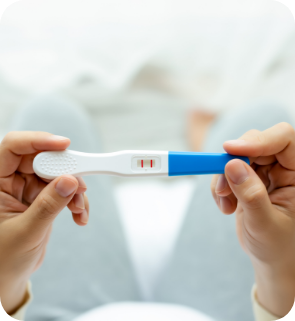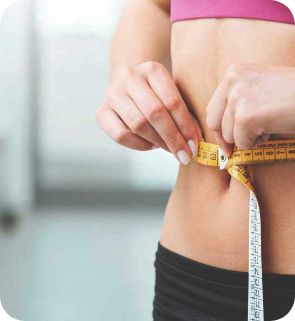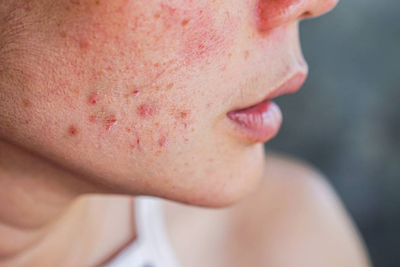
PCOS & Insulin Resistance: Everything You Need To Know
WHAT IS INSULIN RESISTANCE?
70% of women with PCOS will have a varying degree of insulin resistance (IR). A condition where the cells of your body no longer respond to the hormone, insulin, as normal. Insulin is a hormone produced by your pancreas (a gland that sits behind your stomach) that helps to regulate your blood sugar levels. It’s primary job is to move the sugar from your bloodstream into the cells of your body so they can use it for energy, perfecto!
When blood sugar levels rise, let’s say after a meal high in carbohydrates, your pancreas will release insulin into the bloodstream. This insulin will attach itself to the glucose (blood sugar) and shuttle it into the cells of your body that require energy to function, thus, bringing your blood sugar levels back down to normal. When this happens, your pancreas stops its release of insulin as it is no longer required.
I want you to think of insulin as the key to the cells of your body. Without insulin, your blood sugar (glucose) cannot get into the cells that need it, they can’t open the doors by themselves. This leads to high blood sugar levels (hyperinsulinemia), and over-time can lead to prediabetes and type II diabetes.
In someone with insulin resistance, the cells are no longer receptive to insulin, it’s as if the lock on the door is rusted and now the key (insulin) no longer works properly. This causes a build up of blood sugar levels and high insulin levels leading to many of the PCOS symptoms you may be experiencing.
SYMPTOMS OF INSULIN RESISTANCE IN PCOS
Insulin resistance leads to one of the underlying root issues of PCOS: high insulin levels. And this which is one of the underlying root drivers of many of your PCOS symptoms. It's also one of the 4 types of PCOS. The majority of women with PCOS will be insulin resistance PCOS type. Symptoms of PCOS that can be possibly traced back to insulin resistance include.
👉 High testosterone levels (ovaries)
👉 Acne, hair loss, excessive hair growth, depression (all being driven by high testosterone)
👉 Irregular periods and fertility issues
👉 Weight gain
👉 Poor energy levels
👉 Low thyroid output (hypothyroidism)
👉 Inflammation
👉 Sleep disorders
👉 Increased cravings and hunger
IR is also a risk factor for serious health conditions such as type II diabetes and metabolic syndrome (high blood pressure, abdominal obesity, high blood triglycerides, low levels of good cholesterol). It is important to note that Insulin resistance is a major feature of type 2 diabetes, but you can have insulin resistance without having type II diabetes.
INSULIN RESISTANCE AND HIGH TESTOSTERONE
Insulin resistance in women with PCOS is a leading cause of androgen excess. There are two reasons for this:
1) Reduced Production of SHBG (Sex hormone binding globulin)
Sex hormone binding globulin (SHBG) is a protein that is produced by your liver and binds tightly to the sex hormones testosterone, dihydrotestosterone (DHT), and estradiol (an estrogen) to help keep them in regular levels throughout your bloodstream.
SHBG is stimulated by factors such as cortisol, estrogen, and GH (growth hormone), and more important to note in terms of insulin resistance, decreased by androgens, insulin, prolactin, and IGF-1 (insulin like growth-factor). Insulin resistance leads to high insulin and high androgens levels thus, causes you to produce less SHBG, meaning that the levels of testosterone become ‘free’, leading to increased overall androgen levels.
Decreased SHBG levels are found in women with PCOS and are more pronounced in women with PCOS who are also obese. High insulin levels lead to higher fat gain around the midsection. Increased androgen levels have also been shown to increase visceral fat, the fat that coats your internal organs. Women with PCOS who have higher levels of midsection fat gain may experience worse hyperandrogenism by reducing SHBG levels.
2) Directly Stimulates The Ovaries To Produce Androgens
The second way in which insulin resistance increases androgen levels is the fact that high insulin directly stimulates the ovaries to secrete androgens. At your ovaries, insulin resistance leads to defective actions of follicle stimulating-hormone (FSH) and insulin like growth factors (IGF), these ultimately lead to excess production of androgen hormones such as testosterone.
So, insulin resistance is a driving force of androgen excess. One of the most important things you can do to manage your androgen excess symptoms such as acne, hair growth, hair thinning or loss, fertility issues, is to manage your insulin resistance.. Please remember though, that every woman and her PCOS will be different. Not every woman will have high androgen issues or insulin resistance.
If you feel you may have insulin resistance, book in with your local medical professional and have them perform a fasting glucose test for you. You will need to fast for at least 8 hours before this test and then a blood sample will be taken.
- Below 100mg/dl is a normal result.
- 100mg/dl to 125mg/dl is considered insulin resistance.
- Above 125mg/dl can serve as a diagnosis of diabetes.
INSULIN RESISTANCE AND WEIGHT GAIN
An insulin resistant cell will no longer be able to receive adequate amounts of nutrients and energy it needs to function optimally, causing a cascading series of issues.
1️⃣ The insulin resistant cells will no longer recognize insulin, the hormone which acts as a ‘key’ to the cell door, allowing nutrients and energy to enter the cell.
2️⃣ This leads to a build-up of glucose and insulin in the bloodstream which can be extremely dangerous so, your body dumps large amounts of glucose into fat cells, leading to increased fat gain. You could be eating the exact same amount as your best friend but gaining weight whereas they are not.
3️⃣ Seen as the cells are no longer receiving required amounts of nutrients, they send signals to the brain to decrease energy levels, leaving you feeling constantly tired, exhausted, and drained.
4️⃣ At the same time, the cell sends signals to the brain to increase hunger & cravings hoping to increase the amount of nutrients it receives. This is why some women with PCOS have to deal with constant cravings and feelings of hunger.
5️⃣ When you combine increased fat storage (energy partitioning), decreased energy levels, increased hunger & cravings, it's the perfect storm for weight gain.
You will most likely feel completely lost, confused, and frustrated due to gaining weight and having an incredibly tough time trying to lose weight because this is all happening at the cellular level. Any successful long-term weight loss journey for a woman with PCOS MUST be focusing on improving insulin sensitivity!
DIET FOR INSULIN RESISTANCE: 3 SIMPLE GUIDELINES TO FOLLOW
1) Aim for 20% - 30% of your total calorie intake to come from carbohydrates. This means if you’re eating 1,800 calories a day for example, 25% of that is 450 calories, which works out to be around 112 grams of carbohydrates a day.
2) Ensure that your carbohydrates are low-GI, the glycemic index (GI) is a ranking of carbohydrate in foods according to how they affect blood glucose levels, high GI foods cause a large insulin response, low GI foods cause a low insulin response.
3) Try to eat something every 2-3 hours wherever you are awake. Yes, I know that intermittent fasting is incredibly popular now but generally speaking, you don’t have to fast to get results so don’t be jumping up and down. Eating smaller frequent meals will help to minimize insulin spikes and dips
EXERCISE FOR INSULIN RESISTANCE: THE 3 BEST TYPES
Another incredible way to reverse insulin resistance is by increasing the amount of lean muscle tissue you have on your body through resistance (weights) exercise. Studies, including an August 2016 review in Diabetes & Metabolism, established that exercise, and specifically HIIT, resistance, or strength, training expanded the storage capacity for blood sugar in muscle cells and improved insulin sensitivity, effectively reducing the negative health effects of insulin resistance and type 2 diabetes.
The best types of exercise for PCOS are:
1) RESISTANCE (weights)
The benefits of weight training are that it will help build lean muscle tissue, which will help to increase metabolism and overall hormonal state. You should aim to base the majority of your training around resistance workouts and aim for between 2-4 sessions per week.
2) RESTORATIVE (walking, yoga etc)
Restorative exercise is just that - to restore, heal, recover. The aim is to lower stress levels & inflammation. An example would be a nice, slow-tempo walk out in nature for 20-45mins without getting out of breath.
Remember, this exercise is to restore, not to get puffed out & hot and sweaty. Aim for 2-3 sessions per week.
3) HIIT (high-intensity intervals)
This exercise type is amazing for putting you in a healthy hormonal state plus, a HIIT session should never exceed more than 20 minutes in length so it's great if you only have a short amount of time to workout. Aim for 1-2 sessions per week of HIIT.
SUPPLEMENTS FOR INSULIN RESISTANCE
Inositol
Inositol is a water-soluble vitamin-like substance that is naturally occurring closely related to B-vitamins. Inositol acts on the cells of your body as a secondary receptor to the hormone insulin. This is hugely beneficial if you have insulin resistance as inositol acts as a second 'door' allowing insulin to unlock the cell delivering nutrients into the cell in a healthy process.
Inositol is the most well-researched supplement for PCOS with studies finding that it has wonderful benefits on inflammation as well as;
👉 Improves insulin sensitivity
👉 Lowers testosterone levels
👉 Increases SHBG
👉 Restores normal ovulatory activity
👉 Improve egg quality and pregnancy rate
Inositol may also be beneficial in the transport of cholesterol out of the liver to help maintain healthy cholesterol levels. Lastly, because it promotes healthy neurotransmitter metabolism, Inositol may also help to reduce daily stress and occasional anxiety.
Daily dosage will be 3g to 4g.
Magnesium
Women with PCOS are 19x more likely to have a magnesium deficiency compared to women without PCOS, according to a study in Gynaecology Endocrinology.
Magnesium is literally involved in hundreds of important chemical reactions in your body such as regulating blood sugar and insulin, transmitting nerve impulses, regulating temperature, liver detoxification, and it is even part of the formation of bones and teeth.
An important role of magnesium is in glucose (blood sugar) and insulin regulation as it helps glucose enter cells where it is used for energy. Remember that insulin resistance blocks glucose from entering cells.
Insufficient amounts of magnesium can prevent glucose from entering the cells in the amounts that your body needs. As a result, women with insulin resistance tend to experience daily fatigue and difficulties regulating blood sugar leading to fat gain and increased hunger.
Sufficient levels of magnesium can, therefore, improve insulin resistance and reduce your risk of developing type 2 diabetes.
NAC
N-Acetyl Cysteine (NAC) is emerging as an extremely beneficial supplement especially for women with PCOS with one study finding that NAC can improve lipid profile and fasting blood sugar and fasting blood insulin better than metformin.
Another study comparing NAC supplementation vs. Metformin found that both treatments resulted in a significant decrease in body mass index, hirsutism, fasting insulin, free testosterone, and menstrual irregularity, and both treatments had equal effectiveness. Furthermore, NAC led to a significant decrease in both total cholesterol and low-density lipoprotein levels, whereas metformin only led to a decrease in total cholesterol levels.
A systematic review published in Obstetrics and Gynecology, involving eight randomized controlled trials with 910 women that compared the effects of NAC with placebo or metformin in women with PCOS, concluded:
👉 NAC had a significant improvement in pregnancy and ovulation rate as compared to placebo.
👉 Both NAC and Metformin improved BMI, total testosterone, insulin, and lipid levels compared to NAC.
👉 Compared with Metformin, NAC significantly reduced BMI, total testosterone.
👉 Compared with Metformin or placebo, NAC significantly reduced fasting blood glucose in women with PCOS.

















Leave a comment